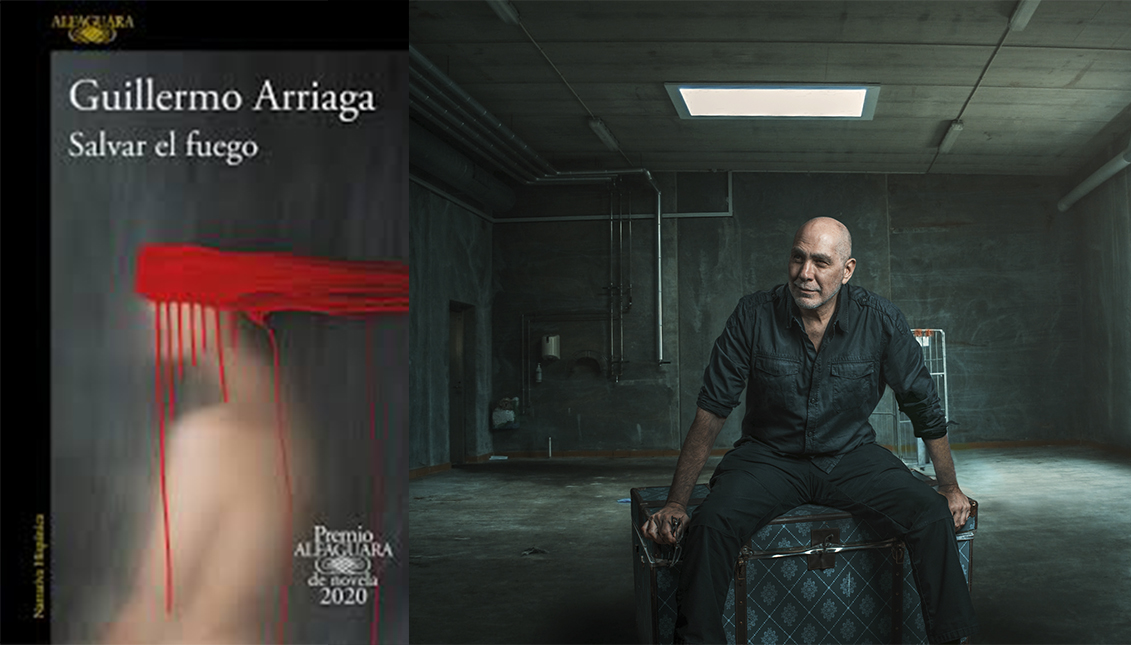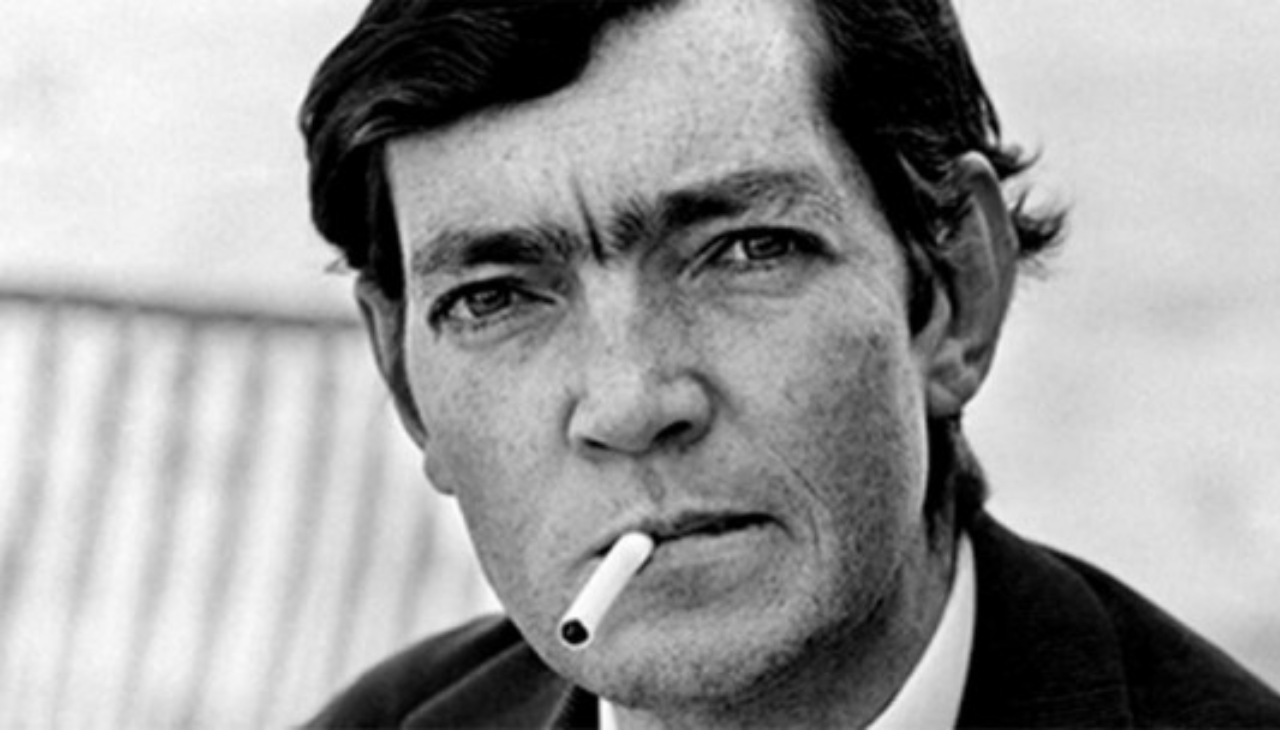
Guillermo Arriaga, the man who "became a forest"
The Mexican writer tells in Saving the Fire, a border story where love is as indomitable as a beast.
Guillermo Arriaga knows the border like the back of his hand. All of them, he says, outside of Sonora. "Since I was a kid, I visited the border five times a year and I have a deep love for it," he says. He plans to go live there at some point. How he describes it-"a territory all by itself," "one of the best places in the world" - makes one want to take a plane and move there too, to meet the people who appear in his books who are frontiersmen, a little like life. Or like all his novels, especially the latest one, Saving the Fire, where there are walls as high as a prison wall, but his characters jump them anyway.
He opens his sweatshirt and proudly shows me the T-shirt from the Unidad Modelo colony, where he and the protagonist of his novel, José Cuauhtémoc, grew up. Cuauhtémoc is a güero Indian imprisoned for accidentally dealing with narcos, an outcast, the son of an indigenous hero who falls in love with an upper-class dancer. Marina is her name, so sapped of creative fire that only at the prison and in Cuauhtémoc's arms does she find a way to light it.
"Mexico has a complex relationship with its roots. There is not a single monument to Hernán Cortés, and even if a child at school makes a mistake and says his hero is Cortés, he can be suspended. Our heroes are Cuauhtémoc - the last Aztec emperor - or Xocoyotzin. There is a greatness of the indigenous and at the same time if they insult you, they tell you that you are an Indian. A 'patarrajada', a 'fool like an Indian'," says Arriaga.
Saving the Fire is a novel written without method, with the crackling of the fire whispering in the writer's ear during its more than 600 pages. But it addresses many burning issues: violence on the border, racism and roots, the snobbery of art and love, which is never chosen, and is extreme and always bordering on death, two of the recurring themes of Guillermo Arriaga's literature.
"I don't know why they say I'm talking about death when I'm talking about life," complains the Mexican, for whom love and literature have a lot to do with hunting, even though there are those who say you don't kill what you love.
"If bow and arrow hunting has taught me anything, it's that we are nature and love is nature too. We hunters love animals deeply, which is something that animalists do not understand. The act of hunting really lasts ten seconds, but when you see a picture of a hunter with his prey what you are seeing is the end and not the process, like when you see a couple making love and you think it's porn because you took away the whole act of seduction and falling in love from before. Sometimes when I hunt I get angry with myself, other times I get sad; it's a very strange feeling, like love," he says.
"I don't know why they say I'm talking about death when I'm talking about life."
Arriaga couldn't write a single line if he didn't hunt. With the frank humility with which he speaks, always from compadre to compadre, he tells me the stories behind the characters in his novels; anecdotes collected in the rancheríos, boys who became hitmen because they had no other choice, people so humble they made themselves oil tacos. Many of them, he assures, are his friends.
RELATED CONTENT
"We writers are vehicles for telling stories. I'm not a migrant, but I'm a friend of migrants and even a godfather to their children. Am I appropriating their experience or trying to express what they can't," he asks when I talk to him about controversies like the one with American Dirt.
For Arriaga, the Mexican reality is not dichotomous but there are a range of individuals who are neither good nor bad, whom life has put in a place and know if they had no other option. "There's a lot of rot, of course, but I've met commanders whose corrupting them is impossible. I have also treated many people who, out of anger and frustration either migrate or get into the narco. But my fellow migrants are desperate, not angry. Then I've met others who say, 'You know what? I watch the dog food commercials and they feed them better than I do. And you know what? I'm less than a dog and I don't mind killing little bourgeoisie," he says, using his ability to take us inside the people and characters and see how the world expresses itself through them, which is what the movies don't achieve.
Thus we see ourselves possessed by the ghost of Ceferino, the father of José Cuauhtémoc, a man with his highs and lows, a national hero and a defender of the indigenous cause who within the four walls of his home is a monster. "Ah, yes," says the writer, "we have all known such people, capable of the best and the worst. Who marry a Spanish woman with the idea of reversing colonization as Ceferino did, or lock their children in cages to make them strong. That, by the way, really happened. It happened to a compadre," he adds.
"I've treated a lot of people who out of anger and frustration either migrate or get into the drug trade. But my migrant compadres are desperate, not angry."
Of course, not everyone is a narco or a person hardened by life. In Saving the Fire he also reflects on art, which is either born from the head, or from emotion and guts, or from the verga, as happens to José. "Híjole, I think I write with my verga too," says Arriaga. "From the middle of the body down, but never with the head."
And it doesn't matter what you create with, or even what for, because what defines art, he says, is permanence."There are writers who are posh, like Borges, and writers who come from the mud, and they've all made masterpieces. There is no such thing as true art, and it comes from the least thoughtful people," he says.
Now that he confesses to me that his novel was going to be called The Lion Behind the Glass, but they changed it because the fire in all its aspects is lit more and more in each of its pages, I see Arriaga on the other side of the screen, with a wall of small wooden trunks behind him, as if he were in a hut. I think that his writing, just as happens to people on the border, who invent a language just like he did, there is no way to put them in a cage. Even if they try, it and they have the virtue of the hunter: to know how to "become a forest."











LEAVE A COMMENT:
Join the discussion! Leave a comment.